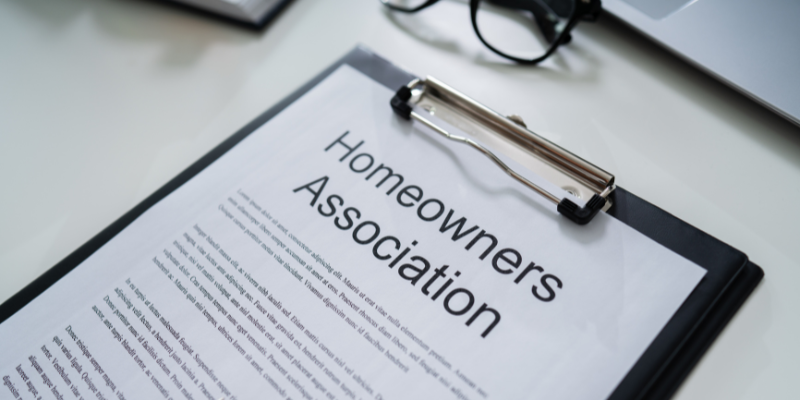
Homeowners Association (HOA) Liens and Foreclosure
In Fort Worth, Texas, Homeowners Associations (HOAs) can legally put a lien on a homeowner’s home if they don’t pay their dues or break the community’s rules. An HOA lien is a formal claim against the property for unpaid fees, and if it is not taken care of, it can lead to foreclosure.

It’s important to know what your rights are as a homeowner in these scenarios. According to Texas law, a HOA can start the eviction process if certain conditions are met, such as when a homeowner repeatedly fails to pay fees or fines the association issues.
However, homeowners are protected by laws that require them to give notice and give them a chance to settle their bills before foreclosure happens. Homeowners should read their HOA’s covenants, conditions, and limits (CC&Rs) to fully understand what they need to do and what options they may have.
Talking to the HOA early on and getting legal help can help keep things from getting worse and leading to default. To keep your house safe from legal actions that could lead to losing ownership because of unpaid association fees, you need to know how liens work and communicate with your HOA on a regular basis.
State Laws Governing Hoas and Property Seizure in Texas
In Texas, homeowners associations (HOAs) can and can’t take land without following certain laws. It’s important for people who live in Fort Worth to know these laws. HOAs can put a lien on a homeowner’s home in Texas if they don’t pay their fees or dues.
But before the HOA can start the eviction process, they have to follow very specific steps set out in the Texas Property Code. This means giving the homeowner proper notice of any late payments and allowing them to settle their bills.
Usually, this process includes sending several notices of default and giving the other party time to settle the disagreement before going to court. Homeowners should know that HOAs have certain rights when enforcing liens, but their power is not unlimited. There are protections in place to keep homeowners’ homes from being taken without a good reason.
Legal Rights of Homeowners in Fort Worth, TX Regarding Hoa Actions
When it comes to what a members’ Association (HOA) does in Fort Worth, TX, members have certain legal rights. It is very important to know these rights so that an HOA can’t take your home without a legal reason.

Texas law protects homes from HOAs that start foreclosure proceedings without following the right procedures. Before doing anything to a homeowner’s land, a HOA must follow the strict steps spelled out in their governing documents and in state law.
This means giving the person due notice and a chance to fix any claimed violations or late payments. Also, homeowners can challenge any claims in court and can do so through mediation or arbitration, depending on the laws in their area.
Fort Worth property owners should know their community’s Covenants, Conditions, and Restrictions (CC&Rs) as well as state laws in order to protect their housing rights from the HOA going too far. People who live in Texas can go to court if they think their HOA is acting outside of its power or not following the right steps. This is to protect their property rights.
Steps Hoas Must Follow to Enforce Property Liens
When pursuing property liens in Fort Worth, TX, homeowners associations (HOAs) must follow certain legal steps. At first, the HOA has to let the homeowner know about any fees or taxes that are due, including a full breakdown of the costs and due dates.
If the homeowner doesn’t pay the owed amount, the HOA may file a lien on the property. This is done by legally recording the lien with the right county office so that it is legal.
The HOA must also let the homeowner know about this move, making sure they understand their rights and any possible outcomes. Under Texas law, HOAs must usually offer mediation or other forms of alternative dispute settlement before starting the foreclosure process.
Once these options have been used up, the HOA can think about going ahead with foreclosure, which must be done in strict accordance with state laws and usually with court approval. During this process, homeowners still have certain rights and protections that the HOA must uphold to make sure that any actions taken to follow the rules are legal and fair.
The Foreclosure Process for HOA related Debts in Texas
In Texas, there are a few important steps that people need to know about in order to avoid foreclosure on HOA debts. Homeowners’ Associations (HOAs) can put a lien on a property if dues or taxes are not paid. This is legal in Fort Worth and all over Texas.

This lien is a legal claim against the land, which will be used to pay off the HOA debt. If the debt is still not paid, the HOA may start the sale process to get rid of this lien.
The first step is to let the homeowner know they are behind on their payments and give them a chance to pay or dispute the bill. If the problem isn’t fixed, the HOA can file a lawsuit in court to get a ruling that lets them take back the land.
Homeowners who might have to go through foreclosure because of HOA debts should know what their rights are under Texas law, such as any redemption times and legal defenses they may have. Knowing about these things can help homeowners negotiate or get legal help to look into options like payment plans or fighting wrong charges before their home is taken away by a HOA-led eviction.
Key Differences Between Mortgage Foreclosures and HOA Foreclosures
In Fort Worth, Texas, homeowners need to know the main differences between HOA foreclosures and bank foreclosures. When a borrower doesn’t pay back their home loan, the lender goes through the legal process to sell the property and get the money they’re due. This is called a mortgage foreclosure.
On the other hand, an HOA foreclosure happens when a homeowner doesn’t pay the required association fees or taxes. Unlike traditional mortgage lenders, homeowners clubs can put a lien on a property in their community for unpaid fees and even go through foreclosure to recover those costs.
Both types of foreclosures can cause people to lose their homes, but they are very different in how the law works and what rights homeowners have. Foreclosures on mortgages are usually overseen by the courts, and each state has its own laws that give borrowers rights, like redemption times and notice requirements.
On the other hand, HOA sales might not always need to go to court, which could speed up the process. Homeowners who are facing either type of foreclosure should know what their rights are under Texas law. They should also talk to a lawyer if they are having trouble with their finances or a disagreement with their loan or HOA.
Common Reasons HOAs Pursue Foreclosure on Properties
Homeowners associations (HOAs) in Fort Worth, TX, can take back homes through foreclosure for a number of common reasons, most of which involve unpaid taxes or dues. When homeowners don’t pay their required HOA fees, the group can put a lien on the property and go through with foreclosure if the debt isn’t paid.
Another reason HOAs might consider taking this extreme action is covenant violations. Repeatedly breaking community rules and laws can lead to fines that add up over time. If you don’t pay these fines, they could lead to a lien and then foreclosure procedures.
Some HOAs can also foreclose if a homeowner seriously breaks the terms of their agreement or fails to maintain their home in a way that hurts the community’s property values or aesthetic standards. To keep such bad things from happening, homeowners need to know what their HOA deal says about their rights and duties.
What Homeowners Should Know About Late Fees and Penalties From HOAs
The Homeowners Association (HOA) in Fort Worth, TX, charges late fees and fines that homeowners need to know about. It is very important to understand these financial responsibilities in order to stay out of trouble with the law and protect home ownership.

HOAs can charge fines for late payments on dues or fees, which can add up quickly if not taken care of right away. Texas law says that homeowners associations (HOAs) must be clear about any fees or fines. This ensures that homeowners know when payments are due and what will happen if they aren’t made.
To fully understand their rights and responsibilities, people who own homes in a HOA should read the governing papers, like the Declaration of Covenants, Conditions, and Restrictions (CC&Rs). Ignoring these fees can cause liens to be put on the property, which could lead to sale if the problem isn’t fixed.
How to Prevent Hoa From Taking Your House in Fort Worth, TX
If you want to keep your Fort Worth, TX home from being taken by a HOA, you need to know what your responsibilities are as a homeowner and keep up with the rules set out in the HOA’s governing papers. Going to HOA meetings on a regular basis can help you stay up to date on any changes or new rules that could affect your property.
Also, make sure you pay your fees and assessments on time to avoid fines that could lead to liens being put on your house. If you are having money problems, you should talk to the HOA ahead of time about possible payment plans or other options.
You can protect yourself in case of a dispute by keeping careful records of all your payments and communication. Also, learn the Texas state rules about homeowners associations to ensure they follow the law.
You can get personalized legal advice from a skilled attorney in Fort Worth who specializes in real estate or HOA law. This will help you protect your property from any unfair actions taken by the homeowners association.
Exploring Alternatives to Foreclosure for Hoa Dues
If a homeowner in Fort Worth, TX, is about to lose their home because they haven’t paid their HOA dues, they have a few options that can help them keep it. It is important to talk to the homeowners association (HOA) directly about payment plan choices that might help with immediate money problems.

Many HOAs are willing to work with homeowners to devise a payment plan that fits their budget while still ensuring full payment of the dues. Mediation can also be helpful because it gives both sides a chance to discuss their problems and reach an understanding that works for everyone without going to court.
Homeowners may also want to refinance their mortgage or apply for a home equity loan, which could give them the money they need to pay their past-due HOA fees. In these situations, it’s very important to get legal information. Talking to a real estate or HOA lawyer can help you understand your rights and possible defenses against foreclosure actions.
You could also call a local housing counseling agency. These groups offer free or low-cost advice on handling your debts and look into government assistance programs that help homeowners with financial problems keep their homes. If you want to sell your home for cash in Dallas, Arlington, Fort Worth, or nearby cities. We buy houses for cash and have options to make the process fast and hassle-free.
How to Negotiate with Your HOA to Avoid Losing Your Home
In Fort Worth, TX, if you don’t want to lose your home because of what your HOA does, you need to know how to negotiate well. First, read your HOA’s governing papers, like the bylaws and covenants, carefully to understand their rules and any specific violations you may be accused of.
Get in touch with your HOA and take care of problems right away by setting up a meeting to talk about possible answers. Always write down everything you say and do, so you have proof if things get heated.
Come up with workable ideas that show you’re ready to follow the rules and protect your homeowner rights and interests. You might want to get help from a mediator or a lawyer who specializes in Texas property law to help you through the talks and speak up for you.
Legal Protections Available to Homeowners Against Unfair HOA Practices
If a homeowner in Fort Worth, TX, is having problems with their Homeowner’s Association (HOA), they can rest easy knowing that they are protected by the law against unfair tactics. Texas law says that HOAs have to be open and follow their governing papers, like bylaws and covenants.

If a HOA tries to take a homeowner’s property, it has to follow strict foreclosure processes, which are often overseen by the courts. This gives homeowners the chance to fight any claims they think are unfair. People who own their own homes can also look at HOA records and go to board meetings to stay up to date on decisions that could affect their property rights.
The Texas Property Code also says that HOAs must give homeowners enough warning before starting the foreclosure process and gives homeowners the option to settle their differences through mediation or arbitration. These legal systems are meant to keep the community safe and prevent HOAs from going too far. They also aim to protect homeowners from practices that could be abusive. We buy houses for cash. At Texas Cash House Buyer, we’re here to help; you can read our reviews and contact us today to see how we can support you every step of the way.
Can a Hoa Take Your Home If It’s Paid Off?
Homeowners Associations (HOAs) in Fort Worth, TX, are very important for keeping the community in good shape. However, many homeowners aren’t sure if a HOA can legally take their home, even if they’ve paid it off in full. It’s important to know what your rights are when it comes to HOA foreclosures.
In Texas, if a homeowner doesn’t pay their required dues or assessments, the HOA can start the foreclosure process. Even if the mortgage is paid off, the property can still have a lien put on it if the HOA fees are not paid.
The homeowners’ association may be able to legally take back the home if these liens are not paid. But there are strict rules about how this process works, and homes have rights that protect them from being wrongfully foreclosed upon.
It’s important for homeowners to know what their HOA agreements say and what financial responsibilities they come with. Talking to a lawyer can help you understand how to handle disagreements with HOAs and protect your property rights. We purchase homes for cash, including properties that may be involved in legal proceedings, while ensuring a fair and respectful process for all parties involved.
What Is the New Law in Texas About HOA?
Texas has passed new laws in the last few years that have a big effect on Homeowners Associations (HOAs) and their power over land ownership. The newest law tries to protect homeowners by making HOAs follow tighter rules, especially when it comes to foreclosures.

If a homeowner in Texas has a HOA, they must now follow certain rules and be more open about their plans before starting a sale on their property. These changes make sure that homeowners have plenty of chances to deal with any fines or unpaid bills and try to get things fixed in a more fair way.
The rule also requires HOAs to be clear about fees and assessments. This makes it less likely that unexpected fines will cause homes to go into foreclosure. Texas is trying to balance the power between homes and HOAs by putting these safety measures in place. This will protect property rights while keeping community standards.
What Happens If I Don’t Pay My HOA in Texas?
In Fort Worth and other cities in Texas, if you don’t pay your Homeowners Association (HOA) fees, you could face serious penalties that could end with the HOA legally taking your home. At first, your HOA will probably charge you late fees and interest on the amounts that are past due, which will add to your debt.
The HOA may put a lien on your home if you don’t pay for a long time. This lien is a formal claim against your home for unpaid debts. It can make it harder to sell or refinance your home in the future.
If the bill isn’t paid, the HOA may proceed with foreclosure to collect what is owed. To prevent this, homeowners should know their rights and duties regarding HOAs under Texas law.
Talking to the HOA early on and getting legal help when you’re having money problems can stop things from worsening and lead to default. Realizing these possible outcomes makes it even more important to talk to and negotiate with your HOA on time to keep your home from being officially taken away because of unpaid assessments.
We understand that Fort Worth is a great place to live, but if you’re moving away for any reason, we can take your house and offer you fast cash.
How Much Power Does HOA Have in Texas?
In Texas, Homeowners Associations (HOAs) have a lot of power that affects how properties are managed and how people live in communities. It’s important to know the limits of an HOA’s power, even though they can police the rules and regulations spelled out in the governing documents.

In Texas, homeowner associations (HOAs) can fine people, keep shared areas in good shape, and ensure community rules are followed. However, they must follow the rules set by state laws.
Under certain conditions, a HOA may start the foreclosure process if a homeowner doesn’t pay their fees or breaks certain rules. But Chapter 209 of the Texas Property Code protects homes by making sure they get due process and fair notice before anything drastic is done.
These legal standards are important for homeowners in Fort Worth and beyond to understand in order to protect their rights and make sure they follow HOA rules. Knowing how much power a HOA has in Texas gives residents the tools they need to handle possible disagreements and protects homeowners’ rights from being violated unfairly by actions taken by the HOA.
